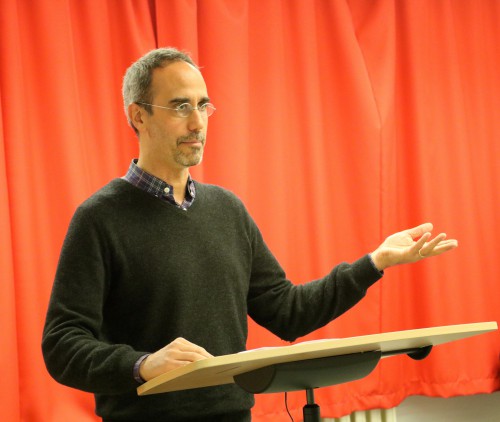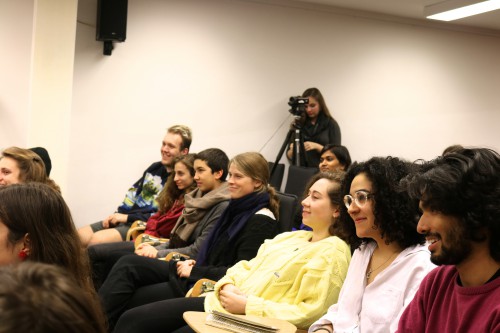
The first time I saw and heard speak a real, published author in flesh and blood was in August of this year as part of the Language and Thinking Program offered at BCB, when Clare Wigfall came to discuss one of her short stories. The next time was in September, when the Romanian author Norman Manea came to answer our questions on writing literature in extreme situations. Most recently, BCB was visited by Paul La Farge, author of four published novels to date and recipient of numerous accolades. Thanks to these visitations, I have become increasingly convinced that the successful writer is not a myth. La Farge came to address any questions his audience had on the topic of “building a writing career” (which to him seems “a strange conjunction of words”), and to share an excerpt from his new and yet unpublished novel, The Night Ocean.
The evening opened with a sneak-peak at The Night Ocean. He described the novel as something akin to a historical fiction piece on H.P. Lovecraft and his friend R.H. Barlow, and was thoughtful enough to briefly outline the course of the two men’s lives and their relationship: Lovecraft was a horror story writer of the early 1900s and Barlow was years later an anthropologist. The two men became great friends through the letters they exchanged when Lovecraft was forty-four and Barlow only fifteen. Lovecraft passed away at the age of forty-six. He entrusted Barlow with the responsibility of publishing his remaining works.
Though La Farge introduced the novel as being about Lovecraft, the excerpt he shared with us concerned Barlow’s later life, after Lovecraft’s death. His words were entrancing: they transported his audience to the 1900s and coloured our vision of the time and place with almost tangible smells and sentiments. Furtive glances at those around me revealed that many in the audience had their eyes closed and mouths drawn with a perhaps unrealised concentration, nodding rhythmically in time with the piece’s underlying musicality. Later in the evening, La Farge spoke of how he draws on music for his writing: “I think that writing on a page passes through the inner ear … that the musicality [of the words] matters.” He broke the spell at a point of suspense in the story, playfully saying “I think I’ll stop there” in such a way that he might have decided this on the spur of the moment.. He was then ready to address any questions we might have, be they on the excerpt or on writing in general.
The first question raised was one concerning the characters. Barlow especially was painted so vividly it made one wonder how, as a first year student asked, La Farge would “mediate between the historical figure and his character”: at what point do the history and fiction aspects of historical fiction diverge? La Farge expressed that, prior to beginning the actual writing of the novel and also during the writing process, he researched these men’s lives “obsessively” in order to be as historically accurate as possible. However, he acknowledged that a character almost certainly does take on a life of its own as the story unfolds, and asserted that “ultimately, the [author’s] main responsibility is to the story.”

The next question got to the beginning of this whole writing business. Why did La Farge first start writing fiction, and why did he continue? It was in Paris, he said, during a university exchange programme. During his six months there, he was “very isolated” and had a lot of time to think. This situation seems similar to what many students here at BCB, especially the freshmen and exchange students, are in the process of experiencing. Another BA1 student and I discussed this later in the evening as we walked back to our apartment building. We came to the conclusion that his sudden transportation from his normal environment into this unfamiliar culture must have forced him to confront himself. He later said that writing oftentimes also comes out of a prolonged period of great boredom, which seems to support our conclusion: In such instances of isolating unfamiliarity or boredom, one is inclined to introspection. For some, such introspection manifests itself in written expression. Though La Farge didn’t mention what his first story was about, he said “it was as if the top of [his] head came off” — that he loved it.
Of course, he said, it is also tedious and difficult, but that you have to turn the critical voice in your head into a constructive one “instead of a voice that just says ‘quit’”. As the conversation proceeded, he inexplicitly outlined why he continues to write despite the sometimes frustrating nature of the work, and how, by extension, one can “build a writing career”.
The prerequisite seems to be that you have to love it. The word came up many times in the discussion. When explicitly asked why he continues, he said without pause “because I love it”. What helps with some of writing’s difficulties is to have a routine of it. La Farge is a self-confessed “believer in routine”. He does not think that writing “comes from a place of deliberation”. As an example, he told us how a friend of his sets aside Saturdays for writing. Even in my comparably short life I have realised that a routine ensures you find time for things you love as well as encouraging otherwise challenging activities (…exercise comes to mind). Aside from a love for it and a routine, perhaps most important of what was discussed is a need for nourishment — the type meant for the soul. While you’re writing, “you have to kind of neglect and ignore everybody,” which is simply not a healthy or sustainable mode of life. “There’s a constant process of nourishment that needs to happen.” The ideal, La Farge says, would be for someone to throw you a big party when you come home and are done for the day. Sadly, this is not feasible for most people. A loving partner is a good substitute, he says. If you don’t have this, I might also recommend something like yoga, tea, exercise, or just savouring sunshine. I can’t say that I’m a yogi myself, but I have found that green tea, running, sunshine, dark chocolate, and meaningful conversations are good soul food.
Even if you have a love of writing, a routine of it, and nourishment for your soul — not to mention any particular talent — this does not guarantee that you will succeed in building a writing career. Many writers, even published ones, must take up side-jobs to support themselves. La Farge complements his writing with an on-and-off teaching post of his craft at Wesleyan University in Connecticut. Though he didn’t imply it was necessary in building a writing career, La Farge said that education is useful to familiarise oneself with language. “To be a writer you have to be at home in language in some deep way … You need to be writing enough that it becomes natural, that it becomes part of your nature”.
He joked early on in the conversation that H.P. Lovecraft, who was “perennially broke”, provides us with a prime example of a successful writer. Despite this being intended as a joke, it rings with truth. What we can take away from the conversation and La Farge’s charming enthusiasm is that, if you do love writing, the work itself is the reward — both the process and the result. On the result, La Farge said that writing pretty much validates his existence. Looking on the real product of his efforts makes him feel as if he has not simply been “wandering from snack to snack” his whole life.
This, I think, is as worthy a goal as any.
[hupso_hide]
